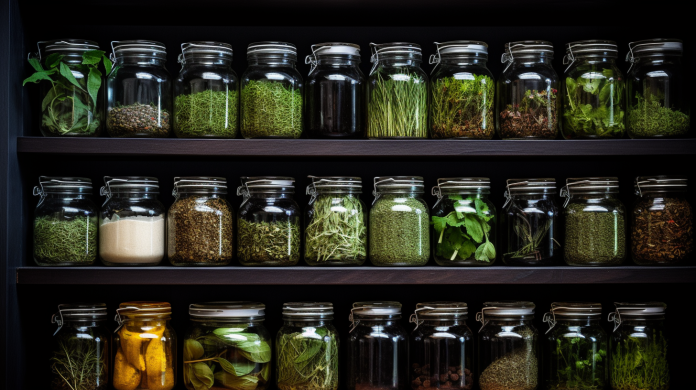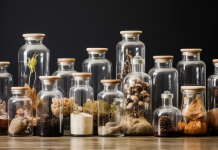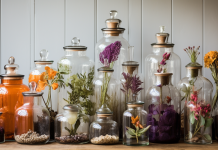Herbs stored in glass jars face several challenges that can impact their quality and shelf life. Moisture control, airtight sealing, sunlight exposure, herb preservation, and odor management are key factors to consider.
Moisture Control
When it comes to moisture control for herbs in glass jars, proper storage techniques are essential. Humidity regulation plays a crucial role in maintaining the quality and longevity of herbs. Excess moisture can lead to mold growth and degradation of the herbs' flavor and aroma.
To ensure optimal moisture control, it is important to consider packaging options that provide a barrier against moisture. One effective option is to use airtight glass jars with silicone seals. These jars prevent moisture from entering and also preserve the herbs' freshness.
Another packaging option is to use moisture-resistant bags made of materials like mylar or polyethylene. These bags provide an extra layer of protection against moisture and help to maintain the herbs' quality during storage. You must ensure these are ‘food-grade', which is designed and certified for use with food products. Food-grade Mylar is subjected to strict quality standards to minimize the risk of chemical contamination.
Personally I prefer the glass jar.
Sunlight Exposure
Sunlight exposure can significantly impact the quality and potency of herbs stored in glass jars. To ensure the light protection and maintain the freshness of the herbs, it is beneficial to consider the storage conditions. Here are three key factors to consider:
- Container color: Opt for dark-colored glass jars, such as amber or cobalt blue, as they provide better light protection compared to clear glass jars.
- Storage location: Keep the glass jars in a cool, dark place away from direct sunlight. This can be a pantry, cupboard, or drawer.
- Duration of exposure: Limit the herbs' exposure to sunlight by minimizing the time they spend outside the storage area during use.
Herb Preservation
One of the most common methods of herb preservation is herb drying. Drying herbs helps to remove moisture, preventing the growth of mold and bacteria that can cause spoilage. There are several ways to dry herbs, such as air drying, using a dehydrator, or hanging them upside down in a cool, dry place.
Once the herbs are dried try to remember to label the jars with the herb's name and date of drying.
Freezing
To freeze fresh herbs, start by washing and thoroughly drying them (in a salad spinner) to remove excess moisture, as ice crystals can degrade their quality.
Choices:
- Herb Cubes: Finely chop the herbs and place them in ice cube trays. Fill each compartment with a little water or olive oil, then freeze. Once frozen, transfer the herb cubes to a resealable freezer bag. These cubes can be added directly to soups, stews, or sautés for instant flavor.
- Herb Bundles: Create bundles of fresh herbs, such as rosemary or thyme sprigs, and place them in airtight freezer bags. Alternatively, you can chop the herbs finely and place them in a single layer on a baking sheet, freeze, then transfer to bags.
- Blanched Herbs: For herbs like basil and cilantro, blanching is recommended. Quickly blanch the leaves in boiling water, then transfer them to an ice water bath to preserve their color. Pat them dry, chop or leave whole, and freeze in an airtight container.
The major benefit of freezing is that you can portion the herbs to suit your cooking style / entertaining threshold. Well labelled ‘cubes' are mega, imho.
Odor Management
Fragrance control and odor elimination are essential for preserving the quality and freshness of herbs. Here are some techniques to manage odors when storing herbs in glass jars:
- Proper sealing: Ensure that the glass jars are tightly sealed to prevent any strong odors from escaping or entering the container.
- Separate storage: Store herbs with strong odors separately from those with milder fragrances to avoid possible cross-contamination.
It's not much of an issue as long as you don't leave them lying about together for a day or more, before the jar process.
Key Takeaways
- Proper moisture control is essential for preserving the flavor and aroma of herbs stored in glass jars. They need to be ‘dry'.
- Airtight sealing of glass jars is important to prevent air and moisture from entering and maintain freshness and flavor.
- Protecting herbs from sunlight exposure by using dark-colored glass jars and / or storing them in a cool, dark place helps maintain their quality and potency.
- Effective herb preservation involves proper drying methods, such as air drying or using a dehydrator.
Conclusion
In conclusion, addressing common challenges and implementing appropriate solutions for herbs stored in glass jars is crucial for maintaining their quality and effectiveness.
Strategies such as moisture control, airtight sealing, sunlight exposure prevention, herb preservation are essential in ensuring the longevity and potency of herbs.
Preparing glass jars for storage of herbs is another whole rigmarole to be addressed in a subsequent article.
Tip: don't set them on the sink as they come out of the oven. 🙁
Let them cool first.
Please see our supporting articles:
Signs of Overwatering and Underwatering Herbs in Glass Jars



